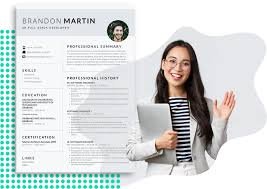
Internship Resume Tips, Format & Samples to Land Your Dream Internship
Internship Resume: Tips, Format, and Samples
In today’s competitive job market, internships play a crucial role in shaping a student’s career. They offer a platform to gain practical experience, develop professional skills, and build a network that can significantly influence future employment opportunities. But landing the right internship requires more than just academic excellence—it requires a strong resume that effectively communicates your skills, achievements, and potential to employers.
An internship resume is different from a professional resume. Since most interns are students or recent graduates with limited work experience, your resume must emphasize skills, academic projects, extracurricular activities, and achievements that showcase your suitability for the role. In this blog, we will guide you through the essential tips, format, and samples to craft an impactful internship resume.
Why an Internship Resume is Important
A well-crafted internship resume is your first point of contact with potential employers. It is a reflection of your professionalism, attention to detail, and ability to communicate effectively. Employers often receive hundreds of applications for a single internship position. A clear, concise, and structured resume can make you stand out and increase your chances of securing an interview.
Additionally, an internship resume is a tool to highlight your transferable skills—qualities such as teamwork, problem-solving, communication, and leadership—that employers value even if you lack professional experience.
Key Tips for Writing an Internship Resume
Here are some actionable tips to create an impressive internship resume:
1. Keep It Concise and Relevant
Internship resumes should ideally be one page. Focus on including information that is relevant to the role. Avoid cluttering your resume with unrelated experiences. Highlight your academic projects, relevant coursework, volunteer work, and any part-time jobs that demonstrate applicable skills.
2. Use a Professional Format
Your resume should be clean, organized, and easy to read. Use standard fonts like Arial, Calibri, or Times New Roman, and keep font size between 10–12 points. Use bullet points for clarity and ensure consistent formatting for headings and dates.
3. Highlight Skills and Achievements
Employers want to see what you can do. Include a skills section that lists technical skills (like programming languages, design tools, or software proficiency) and soft skills (like teamwork, problem-solving, and communication). Mention achievements such as academic awards, certifications, or leadership roles in clubs.
4. Tailor Your Resume to the Internship
Avoid sending the same resume to multiple companies. Customize your resume for each internship by analyzing the job description and emphasizing the skills and experiences most relevant to the role. Use keywords from the job posting to make your resume more appealing to applicant tracking systems (ATS).
5. Include Academic Projects and Coursework
If you have limited work experience, your academic projects, research, or relevant coursework can demonstrate your capability. Describe your role, the tools you used, and the outcome of the project to show practical application of your knowledge
.
6. Proofread and Avoid Errors
Even minor spelling or grammatical mistakes can create a negative impression. Proofread your resume multiple times and consider asking a mentor or friend to review it. Proper formatting, grammar, and punctuation reflect your attention to detail and professionalism.
Internship Resume Format
A standard internship resume typically includes the following sections:
1. Header
Include your full name, phone number, email address, and LinkedIn profile link. You may also include a personal website or portfolio link if relevant.
Example:
Mehak Gupta Phone: +91-XXXXXXXXXX Email: mehak.gupta@email.com LinkedIn: linkedin.com/in/mehakgupta Portfolio: www.mehakgupta.com
2. Objective or Summary (Optional)
A short statement (2–3 lines) explaining your career goals and what you aim to achieve through the internship.
Example:
Motivated Computer Science student seeking a summer internship at a leading tech company to apply my skills in web development and data analysis while gaining hands-on experience in real-world projects.
3. Education
List your educational qualifications in reverse chronological order. Include the degree, institution, year of passing, and GPA (if strong).
Example:
Bachelor of Technology in Computer Science ABC University, 2025 GPA: 8.7/10
4. Skills
Categorize your skills into technical and soft skills to make them easily scannable.
Example:
Technical Skills: Python, Java, HTML/CSS, SQL, MS Excel Soft Skills: Communication, Teamwork, Problem-Solving, Time Management
5. Projects and Academic Work
Highlight projects that demonstrate your skills. Include project title, tools/technologies used, and a brief description.
Example:
Project: Online Food Delivery Web Application Technologies: HTML, CSS, JavaScript, Firebase Description: Developed a web application to streamline food ordering for local restaurants, enabling users to place orders, track deliveries, and provide feedback.
6. Work Experience (If Any)
Include internships, part-time jobs, or volunteer work. Focus on responsibilities and achievements.
Example:
Intern, XYZ Solutions June 2024 – August 2024 - Assisted in developing a dashboard for client analytics using Python and Excel - Collaborated with a team of 5 to improve data reporting efficiency by 20%
7. Achievements and Certifications
Mention academic awards, certifications, or online courses relevant to your field.
Example:
- Certified in Data Science by Coursera - Winner, College Coding Hackathon 2024
8. Extracurricular Activities (Optional)
Include leadership roles, clubs, or volunteer work to showcase your personality and interests.
Sample Internship Resume
Objective:
Motivated Computer Science student seeking a summer internship at a leading tech company to apply my skills in web development and data analysis while gaining hands-on experience in real-world projects.
Education:
Bachelor of Technology in Computer Science, ABC University, 2025
GPA: 8.7/10
Skills:
Technical Skills: Python, Java, HTML/CSS, SQL, MS Excel
Soft Skills: Communication, Teamwork, Problem-Solving, Time Management
Projects:
-
Online Food Delivery Web Application – Developed a web app using HTML, CSS, JavaScript, and Firebase for ordering and delivery tracking.
-
Data Analysis of Student Performance – Analyzed student grades using Python and Excel to identify key improvement areas.
Work Experience:
-
Intern, XYZ Solutions – Assisted in developing client analytics dashboards, improved data reporting efficiency by 20%.
Achievements & Certifications:
-
Certified in Data Science by Coursera
-
Winner, College Coding Hackathon 2024
Extracurricular Activities:
-
Member, Coding Club, ABC University
-
Volunteer, NGO for Education Initiatives
Common Mistakes to Avoid
-
Including Irrelevant Information – Only add content that strengthens your application for the internship.
-
Using Generic Objectives – Customize your objective to align with the internship.
-
Overloading with Technical Jargon – Keep your resume understandable even to non-technical HR personnel.
-
Neglecting Formatting – Ensure consistency in font, bullet points, and spacing.
-
Ignoring Keywords – Many companies use ATS to filter resumes. Including relevant keywords can improve your chances.
FAQs on Internship Resumes
Q1. How long should an internship resume be?
A: Internship resumes should ideally be one page. Since most interns have limited work experience, one page is sufficient to highlight your skills, projects, and achievements effectively.
Q2. Should I include hobbies in my internship resume?
A: Hobbies can be included if they are relevant or demonstrate transferable skills such as leadership, creativity, or teamwork. Avoid generic hobbies that do not add value.
Q3. Can I use the same resume for multiple internship applications?
A: It’s better to tailor your resume for each application. Highlight skills, experiences, and projects relevant to the specific internship role. Customized resumes increase your chances of getting noticed.
Creating a strong internship resume is the first step toward building your professional journey. By following the tips, format, and examples shared above, you can craft a resume that captures attention, showcases your potential, and helps you secure the internship of your dreams. Remember, your resume is not just a document—it’s your personal brand in front of prospective employers. Make it count!



